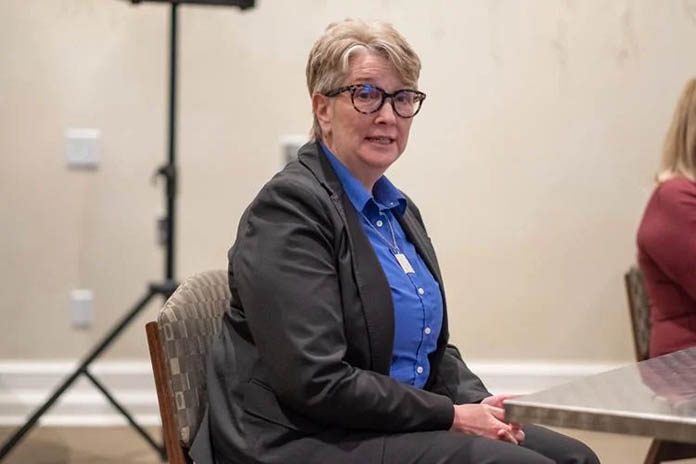
The circuit court for Umatilla and Morrow counties earlier this year made a few changes to how it handles guardianship and conservatorship cases.
The court began working with Guardian Partners, an Oregon-based nonprofit focused on supporting guardians and protected persons, to provide education and court monitors.
Guardian Partners works with 21 counties as of its June expansion into Morrow, Umatilla, Union and Wallowa counties to provide education, monitoring services or both. Morrow and Umatilla opted for both, while Union and Wallowa implemented the education, at least for now.
Appointing a guardian for an adult requires a judge to determine whether that person has a cognitive impairment or incapacity that prevents them from making their own decisions. In Oregon, guardians are responsible for a person’s health and well-being, while conservators are responsible for a person’s assets or finances.
“Guardians and conservators are generally approved if they meet statutory requirements, and neither the protected person nor other related parties object,” said Judge Eva Temple, of the 6th Judicial District, in a statement. “If a person objects to the appointment of a guardian or conservator, the court sets a hearing to determine whether a guardian or conservator is needed and whether the proposed guardian or conservator is appropriate for the job. The court appoints an attorney for the protected person to ensure their rights are protected and that their point of view is heard.”
In Umatilla and Morrow counties, as of Sept. 6, there are 195 adults and 128 minors under some form of guardianship or conservatorship. The law requires minors to have guardians because they are underage.
Taking responsibility
Because of this responsibility, guardians hold a lot of power over the person they’re charged with protecting. That’s where Guardian Partners steps in.
The nonprofit offers an hour-long, online education program for appointed guardians to learn about their responsibilities and what is expected of them legally.
“We find that most guardians really genuinely care about their protected person, it’s usually a loved one, and they have good intentions,” said Marc Kochanski, executive director. “Often they fall short and when they do, it is usually because of either lack of resources, they’ve been doing it too long and they’re burning out, or they themselves are aging and starting to deal with health and cognitive problems.”
Kochanski said Guardian Partners can help connect guardians to resources to support them in caring for their loved one.
The court can ask local volunteers with Guardian Partners to check in on a guardianship and see how it’s going. These audits can be random, but red flags also can be a prompt, such as a guardian failing to fill out the annual report to the court or someone in the protected person’s life reporting a concern.
At the 6th Judicial Court, it’s Temple who generally handles guardianship or conservatorship cases.
“We believe the education provided by Guardian Partners will help guardians and conservators to better understand what it means to have a fiduciary duty to protect the protected person and their assets,” Temple said. “We hope it will prevent guardians and conservators from abusing their positions.”
Kochanski said the people with ill intent, who abuse their roles, are few and far between. By and large, poor care of the protected person is not what the guardian wants, but in the times when there is intentional abuse, Guardian Partners can help.
“Until Guardian partners was founded 10 years ago, the courts had little ability to respond (to a manipulative guardian),” he said. “They had few tools to look in on guardianships and gather information to figure out what was needed and what could improve the life of that protected person.”
Monitors make a difference
But now, between mandatory education through Guardian Partners paired with volunteer court monitors, many courts across the state have a system aimed at ensuring positive outcomes with guardianships.
Jeni Bennett, monitoring program manager with the nonprofit, said the monitoring reviews are “not meant to be punitive, but rather just checking in, making sure things are going OK.” As part of the review process, the monitors talk with the guardian, the protected person and others in that person’s circle, such as friends, relatives and care providers, to see what everyone thinks of the relationship.
In some cases, she said, the guardians were only needed temporarily, such as while the person dealt with a severe health crisis, and the monitor may recommend the court vacate the guardianship. Other times, a guardianship is something that will be necessary throughout a person’s life, and the monitor can make sure the guardian has what they need to take care of the protected person without reporting a need for changes.
“Our involvement is meant to be short-term, we don’t remain on cases too long,” Bennett said of their work across Oregon. “Last year, we closed almost 200 cases we had our volunteers working on, and in almost 85% of those cases, we offered some sort of resource.”
Guardian Partners is now in the process of recruiting volunteers in Umatilla and Morrow counties, Kochanski and Bennett said. The nonprofit looks for people who can spend about 10 to 12 hours per month on a cumulative average of 10 cases, which comes out to about a year-long volunteer commitment.
“We really want our volunteers to be residing in the communities that we serve,” Bennett said. “We just really look for someone who is dedicated to making an impact. We want someone that really enjoys meeting with folks that might be vulnerable and someone who will protect and serve the dignity of the folks under guardianship.”










